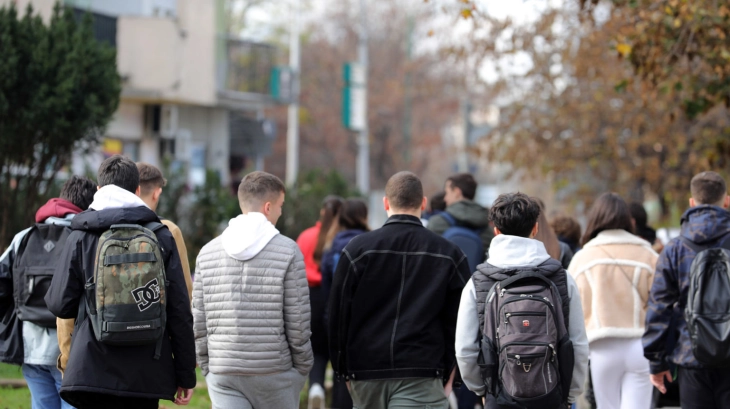Education Ministry instructs schools to switch to online classes when receiving bomb threats
- Reports of bomb threats received by schools via email since October last year instill panic among students, disrupt their mental health and negatively affect their socialization, said participants in a forum held as part of a scholarly research project of Ss. Cyril and Methodius University - Skopje.

Skopje, 23 February 2023 (MIA) - Reports of bomb threats received by schools via email since October last year instill panic among students, disrupt their mental health and negatively affect their socialization, said participants in a forum held as part of a scholarly research project of Ss. Cyril and Methodius University - Skopje.
The forum was held on Thursday at the Georgi Dimitrov high school in Skopje, which is among the schools in the capital that received a bomb threat via email this morning, after which the students were evacuated from the building. In order not to miss out on classes, students should return to their homes and switch to online instruction within an hour.
The Ministry of Education and Science has sent instructions to school directors across the country about urgent measures to be taken for the smooth implementation of the educational process in a safe and stimulating work environment.
The Education Ministry has provided elementary schools and high schools with guidelines and ways of using email addresses, ways to strengthen entry and exit controls at schools, and has instructed schools to switch to distance learning (online classes) on days when they receive bomb threat, instead of fully suspending classes.

Aleksandar Angelkovikj, who is a fourth-year student at the Georgi Dimitrov high school, says that bomb threats and missed classes are a big problem.
"I hope the Education Ministry and other competent institutions will come out with a solution that's now belated. It would be good to get help from our partners in NATO and the European Union in order to overcome this major issue," Angelkovikj said, adding that if online instruction is the only alternative given by authorities, it will succeed.
According to Skopje University rector Nikola Jankulovski, missed classes will be reflected on future university students, but they can be compensated for.
"I believe teachers will do anything to make up for the classes missed. Of course, online teaching has not been forgotten. The Education Ministry should have a strategy for this and I think it is preparing for another teaching modality if these things continue. But every strategy is not easy to implement, it takes time and I believe the Ministry of Education and Science will soon deal with this challenge," said Jankulovski.

Security expert and professor Marjan Gjurovski believes it is necessary to think about blended learning, and to consider the option of returning mostly to distance learning.
"We must not as a society just sit and watch as the bomb threats happen, evacuating the students and then taking them back to the classrooms, because this problem has two aspects - security and education. I believe it is time for the state to consider all alternatives and options to have most part of the teaching process back to distance learning," said Gjurovski.
Professor Tatjana Stojanovska-Ivanova from the Institute of Sociology at the Faculty of Philosophy believes the frequent bomb threat reports that create panic have imposed a situation that is not a naive one because, she stressed, the entire educational process is called into question and moral degradation is happening.

"We can't afford to have lost generations who will not only lack knowledge, but will have a kind of moral and value vacuum... This can go on forever. So now what, are we going back to online classes again? What's the point of that," said Stojanovska-Ivanova.
She called for a national strategy on security risks that would cover both cyber attacks and cyber violence, and urged to have experts and competend persons included in its development so as to finally enable the normal functioning of education.







